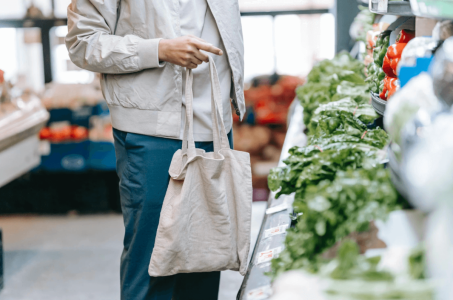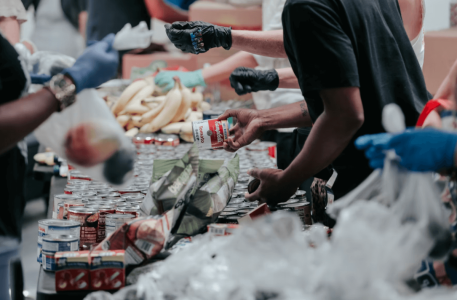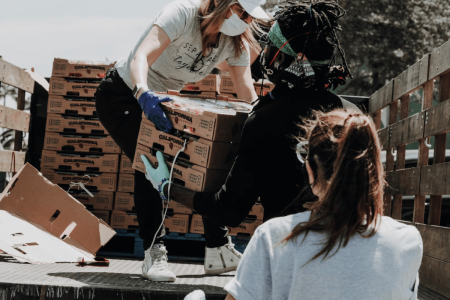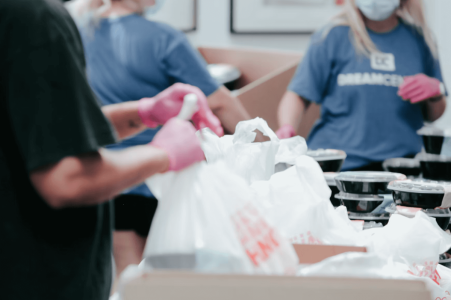‘Unseen’ Crisis Hitting Australia Hard
- Replies 13
Many of us may not realise that there are Aussies who are currently experiencing a hidden crisis. Many are struggling to put food on their tables.
It's not just a few people; it's a growing number of Australians who are finding it difficult to access nutritious and filling food. With the cost of living rising and steady unemployment rates, many Australians are struggling.
The COVID-19 pandemic has made things even worse. With job losses and economic uncertainty, people who were already struggling were hit even harder.
Community groups and food banks are also reporting a surge in demand for their services. These organisations have become essential lifelines for many Aussies, but they can only do so much.

The statistics are startling. In one example, over 200 people are lining up every day at a free community food bank in Sydney. This is not just alarming, but it is also heartbreaking.
The founder and CEO of Community Cafe, Kirsty Parkes, has shed some light on the reasons behind this surge in demand. According to her, the rising cost of living, including rent, grocery prices, and interest rates, has made life even more challenging for many Australians.
As Kirsty points out, this increase in demand is not just due to those who are unemployed; the so-called 'working poor' are also struggling to make ends meet.
These people are doing their best to work and earn a living, but they are still finding it challenging to put food on the table. What's even more alarming is that the situation is reportedly worse in South West Sydney. Families living in the area are facing poor living conditions and escalating consumer prices, which has exacerbated the problem.

The COVID-19 pandemic has brought about unprecedented challenges for communities across the world, and the people of Liverpool LGA in Australia are no exception.
Ms Parkes recognised the urgent need for a food outreach program to support the predominantly low-income community during the suburb-based lockdown. The program began in July 2021, providing much-needed relief for people struggling to access food.
The lockdown made it difficult for people to travel to their normal food relief programs. That's when Ms Parkes stepped in to ensure that people had access to the food they needed, right in their own community.
The impact was immediate and profound, with more than 200 people a day receiving support from the program.
After an 11-day renovation, the community service recently reopened, and the demand for the service is still as strong as ever. By 11 am on the first day, 18 people had already joined the queue, with some arriving before 10 am. As the day went on, the line grew to more than 30 people, with families coming directly from after-school pick-up.
Ms Parkes shared that those who need assistance will not be required to give any explanations, saying: 'Take what you need, no questions asked.'

For those lining up at the Community Cafe, the financial strain is all too real. One local resident, Sarah Burchell, 42, shared her experience of the rising cost of groceries, which has only gotten more expensive.
She notes that prices have increased significantly, with the cost of half a kilo of mince rising from $6 to $10. While some might dismiss the increase as only $4, for families like hers, it can quickly add up. She shared that her weekly shop has increased from $250 to $350, putting a significant strain on their already tight budget.
The impact of the rising cost of living in Australia goes beyond just the grocery store, as Kelly Butters, a friend of Sarah Burchell, shared. For families like hers, even basic decisions like where to buy petrol can become a complicated math equation.
She argues that trying to find the cheapest price is not always worth it because the cost of driving there can outweigh any savings. In the face of such uncertainty, it's hard to plan a budget and stick to it, which puts even more pressure on families.
Ms Butters is also acting as her husband's carer, which means she needs to factor in the costs of specialist appointments, medication, and hospital parking into her thinning budget.
She shares how a $300 specialist appointment might only get her $20 back from Medicare, and she cannot miss the appointments since her husband's life depends on it.
The financial strain is becoming too much for her household, and they are having to make difficult choices every day.

Ms Butters' story is just one of many examples of the financial struggles faced by Australians every day. The impact is not just limited to rising grocery prices but extends to every aspect of life, including healthcare, transportation, and housing.
Many of us take access to food for granted, but the sad reality is that many Australians are struggling to put food on the table. Food insecurity is a major issue that affects not only those on low incomes but also those who have lost their jobs or are unable to work anymore.
Foodbank Australia, the largest food assistance organisation in the country, has reported a surge in demand for their services. They, along with other front-line charities, are working tirelessly to distribute food to those in need.
If you or someone you know is experiencing food insecurity, please do not hesitate to reach out for help. It is important that we all work together to support our community during these challenging times.
Here's how to get in touch with Foodbank Australia:
Foodbank QLD
179 Beverley St, Morningside QLD 4170, Australia
+61 7 3395 8422
Foodbank NSW & ACT
50 Owen St, Glendenning NSW 2761, Australia
+61 2 9756 3099
Foodbank SA
377 Cross Rd, Edwardstown SA 5039, Australia
+61 8 8351 1136
Foodbank VIC
4/2 Somerville Rd, Yarraville VIC 3013, Australia
+61 3 9362 8300
Foodbank WA
23 Abbott Rd, Perth Airport WA 6105, Australia
+61 8 9258 9277
Foodbank TAS
4-8 Sunmont St, Derwent Park TAS 7173, Australia
+61 3 6274 1052
Back in 2018, Foodbank reported that residents of rural and regional Australia were 11 per cent more likely to struggle to put food on their tables than people living in the major cities. It’s likely this number has continued to grow.
In the past, we’ve noticed members mentioning a lack of food relief in their rural or regional communities. Please contact Foodbank as more locals may have opened up. There are also smaller community-run food relief organisations. Often churches will have a regular food support network for those struggling. You can find information on local bulletin boards.
It's okay to feel overwhelmed and stressed, but we want you to know that you are not alone. There are resources and people who are here to help you. You are a valuable member of our community and we want to make sure that you are taken care of.
We encourage you to reach out to them and take advantage of the support they can provide. Please don't be afraid to ask for help, as many people go through difficult times and need assistance.
Here’s a link to the mental health helplines available for Australians.
Remember, this situation is temporary and you will get through this. Take care of yourself and know that there are people who care about you and your well-being.
Members, what are your thoughts on this article? Have you noticed that it's becoming more challenging to keep your budgets in check lately? If so, how are you coping with these changes? Have you found any strategies that have helped you stay on top of your finances despite the challenges?
Share them with us in the comments section below!
It's not just a few people; it's a growing number of Australians who are finding it difficult to access nutritious and filling food. With the cost of living rising and steady unemployment rates, many Australians are struggling.
The COVID-19 pandemic has made things even worse. With job losses and economic uncertainty, people who were already struggling were hit even harder.
Community groups and food banks are also reporting a surge in demand for their services. These organisations have become essential lifelines for many Aussies, but they can only do so much.

More and more Australians are finding it difficult to put food on the table due to the increased costs of living and supermarket prices. Credit: Unsplash/Michael Burrows.
The statistics are startling. In one example, over 200 people are lining up every day at a free community food bank in Sydney. This is not just alarming, but it is also heartbreaking.
The founder and CEO of Community Cafe, Kirsty Parkes, has shed some light on the reasons behind this surge in demand. According to her, the rising cost of living, including rent, grocery prices, and interest rates, has made life even more challenging for many Australians.
As Kirsty points out, this increase in demand is not just due to those who are unemployed; the so-called 'working poor' are also struggling to make ends meet.
These people are doing their best to work and earn a living, but they are still finding it challenging to put food on the table. What's even more alarming is that the situation is reportedly worse in South West Sydney. Families living in the area are facing poor living conditions and escalating consumer prices, which has exacerbated the problem.

Over 200 people a day are expected to line up for free groceries at the local food bank. Credit: Pexels/Joel Muniz.
The COVID-19 pandemic has brought about unprecedented challenges for communities across the world, and the people of Liverpool LGA in Australia are no exception.
Ms Parkes recognised the urgent need for a food outreach program to support the predominantly low-income community during the suburb-based lockdown. The program began in July 2021, providing much-needed relief for people struggling to access food.
The lockdown made it difficult for people to travel to their normal food relief programs. That's when Ms Parkes stepped in to ensure that people had access to the food they needed, right in their own community.
The impact was immediate and profound, with more than 200 people a day receiving support from the program.
After an 11-day renovation, the community service recently reopened, and the demand for the service is still as strong as ever. By 11 am on the first day, 18 people had already joined the queue, with some arriving before 10 am. As the day went on, the line grew to more than 30 people, with families coming directly from after-school pick-up.
Ms Parkes shared that those who need assistance will not be required to give any explanations, saying: 'Take what you need, no questions asked.'

The impact of the rising cost of living in Australia goes beyond just the grocery store. Credit: Pexels/Joel Muniz.
For those lining up at the Community Cafe, the financial strain is all too real. One local resident, Sarah Burchell, 42, shared her experience of the rising cost of groceries, which has only gotten more expensive.
She notes that prices have increased significantly, with the cost of half a kilo of mince rising from $6 to $10. While some might dismiss the increase as only $4, for families like hers, it can quickly add up. She shared that her weekly shop has increased from $250 to $350, putting a significant strain on their already tight budget.
The impact of the rising cost of living in Australia goes beyond just the grocery store, as Kelly Butters, a friend of Sarah Burchell, shared. For families like hers, even basic decisions like where to buy petrol can become a complicated math equation.
She argues that trying to find the cheapest price is not always worth it because the cost of driving there can outweigh any savings. In the face of such uncertainty, it's hard to plan a budget and stick to it, which puts even more pressure on families.
Ms Butters is also acting as her husband's carer, which means she needs to factor in the costs of specialist appointments, medication, and hospital parking into her thinning budget.
She shares how a $300 specialist appointment might only get her $20 back from Medicare, and she cannot miss the appointments since her husband's life depends on it.
The financial strain is becoming too much for her household, and they are having to make difficult choices every day.
Key Takeaways
- There is an 'unseen' crisis in Australia: an increasing number of Australians are going hungry.
- Every day, more than 200 people wait in line outside a Sydney community food bank seeking free food.
- Aside from those who are unemployed; the so-called 'working poor' are also struggling to make ends meet.
- The impact of the rising cost of living in Australia goes beyond just the grocery store, as families also need to factor in the costs of petrol, medication, appointments, parking, and many more.
Many of us take access to food for granted, but the sad reality is that many Australians are struggling to put food on the table. Food insecurity is a major issue that affects not only those on low incomes but also those who have lost their jobs or are unable to work anymore.
Foodbank Australia, the largest food assistance organisation in the country, has reported a surge in demand for their services. They, along with other front-line charities, are working tirelessly to distribute food to those in need.
If you or someone you know is experiencing food insecurity, please do not hesitate to reach out for help. It is important that we all work together to support our community during these challenging times.
Here's how to get in touch with Foodbank Australia:
Foodbank QLD
179 Beverley St, Morningside QLD 4170, Australia
+61 7 3395 8422
Foodbank NSW & ACT
50 Owen St, Glendenning NSW 2761, Australia
+61 2 9756 3099
Foodbank SA
377 Cross Rd, Edwardstown SA 5039, Australia
+61 8 8351 1136
Foodbank VIC
4/2 Somerville Rd, Yarraville VIC 3013, Australia
+61 3 9362 8300
Foodbank WA
23 Abbott Rd, Perth Airport WA 6105, Australia
+61 8 9258 9277
Foodbank TAS
4-8 Sunmont St, Derwent Park TAS 7173, Australia
+61 3 6274 1052
Back in 2018, Foodbank reported that residents of rural and regional Australia were 11 per cent more likely to struggle to put food on their tables than people living in the major cities. It’s likely this number has continued to grow.
In the past, we’ve noticed members mentioning a lack of food relief in their rural or regional communities. Please contact Foodbank as more locals may have opened up. There are also smaller community-run food relief organisations. Often churches will have a regular food support network for those struggling. You can find information on local bulletin boards.
It's okay to feel overwhelmed and stressed, but we want you to know that you are not alone. There are resources and people who are here to help you. You are a valuable member of our community and we want to make sure that you are taken care of.
We encourage you to reach out to them and take advantage of the support they can provide. Please don't be afraid to ask for help, as many people go through difficult times and need assistance.
Here’s a link to the mental health helplines available for Australians.
Remember, this situation is temporary and you will get through this. Take care of yourself and know that there are people who care about you and your well-being.
Members, what are your thoughts on this article? Have you noticed that it's becoming more challenging to keep your budgets in check lately? If so, how are you coping with these changes? Have you found any strategies that have helped you stay on top of your finances despite the challenges?
Share them with us in the comments section below!








